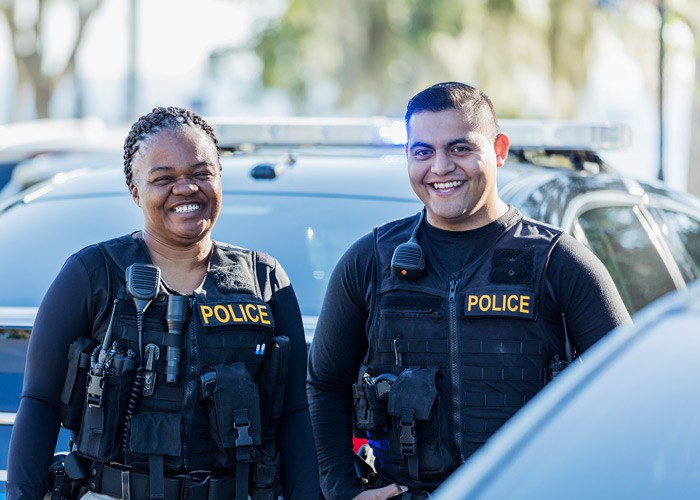Introduction
Policing is one of the most psychologically demanding professions. Repeated exposure to trauma, violence, and human suffering takes an immense toll on mental health. Sadly, a culture of stoicism and stigma often prevents officers from seeking help. Left unaddressed, cumulative stress leads to burnout, PTSD, depression, and tragically, suicide. But by fostering open dialogues and promoting proven coping strategies, agencies can combat the silent crisis under the badge. This comprehensive guide explores pragmatic approaches to strengthening officer mental health and resilience. Let’s provide our brave men and women the support they deserve.
Scope of the Issue
Before examining solutions, it’s essential to grasp the severity of the problem. Studies reveal:
- 1 in 4 officers has symptoms of PTSD – a rate on par with military veterans.
- Officers’ suicide rate is 3 times higher than the general public. Over 140 die by suicide annually.
- 40% of officers suffer from sleep disorders – an effect of hypervigilance needed on the job.
- Officers have higher rates of destructive coping mechanisms including alcoholism, drug abuse, and marital issues.
Yet despite grappling with severe stress, only 25% seek counseling due to fears of judgment or professional impacts. A multifaceted approach is urgently needed to serve our protectors.
Training Initiatives
Specialized training is the first line of defense, teaching officers how to mentally prepare for and healthily process trauma. Departments should:
- Incorporate resiliency training into academy curriculum to set the foundation for managing stress.
- Utilize virtual reality simulations of traumatic events to prepare recruits for real-world exposures.
- Offer continuing education on warning signs, tools like breathing exercises, and maladaptive coping habits to avoid.
- Frame stresses as normal reactions to abnormal circumstances – not personal deficiencies.
- Bring in expert speakers on topics like police marriage advice and financial health.
- Incentivize stress management, meditation, and yoga classes.
Proper training lessens stigma and equips officers to help themselves and colleagues.
Peer Support Programs
Peer support fills a critical niche in mental health infrastructure. The shared experiences between officers foster trust and openness that outside counselors often lack. Best practices for peer support include:
- Recruiting volunteer peer counselors across ranks and specialties – they should complete specialized crisis intervention training.
- Implementing ride-alongs where counselors engage with officers on shift. Rapport strengthens proactive support.
- Ensuring counselors represent department diversity – women, minority, and LGBTQ+ counselors provide safer spaces.
- Communicating total confidentiality so officers know conversations occur off the record.
- Embedding peer supporters across units to normalize their presence and availability.
- Using peer teams for ride-along debriefs after traumatic incidents to provide reassurance.
The badge of a peer counselor holds power. Departments must harness and professionalize this invaluable resource.
Confidential Counseling
While peer support fills short-term needs, professional clinical counseling is essential for ongoing treatment. To make services truly accessible, agencies should:
- Contract independent specialists ensuring total confidentiality – no notes to the department.
- Provide flexible scheduling options so officers can attend discreetly.
- Consider offering on-site clinicians for maximum accessibility and privacy.
- Negotiate group rates and extended insurance for families.
- Set policies allowing time-off to attend therapy without repercussions.
- Have therapists specialize in police culture and PTSD treatment modalities like EMDR.
- Appoint wellness coordinators to help connect officers to the right resources.
Access to confidential expert care is the cornerstone of psychological wellbeing. Budget for it.
Self-Care Promotion
Individual officers must play an active role in managing their resilience. Agencies can assist by:
- Discussing research on diet, exercise, sleep hygiene, and relaxation techniques that alleviate stress.
- Offering wearable tech that tracks biometrics and stress indicators – personal data motivates self-care.
- Allowing modified schedules when possible to improve work-life balance and avoid burnout.
- Instituting mandatory offline periods prohibiting after-hour work communications.
- Building private spaces like gyms and quiet rooms for personal recharging during shifts.
- Organizing family events, recreational leagues, and low-cost vacations officers can use to decompress.
- Conducting anonymous department-wide resilience surveys via platforms like Officer Survey to identify pain points.
Enable and encourage officers to care for themselves physically and psychologically.
Reduce Stigma
Equally important to providing care resources is fostering an environment where seeking help is destigmatized. Strategies include:
- Sharing officer testimonials about their treatment journeys. Representation matters.
- Incorporating mental health discussions into daily roll calls – make it a routine topic, not a crisis intervention.
- Celebrating peer supporters and clinicians as valued members of the agency team.
- Electing a Chief Resilience Officer to oversee cultural change alongside programs.
- Ensuring leaders model healthy coping mechanisms, not destructive ones.
- Severely disciplining those who belittle others for seeking treatment. Intolerance must have consequences.
Culture starts at the top. Chiefs must lead this change.
Ongoing Support
Finally, mental health must remain an ongoing priority with programs continually evolving to meet needs. Recommendations:
- Regularly poll officers anonymously on department culture, stresses, and program feedback using platforms like Officer Survey. Listen and adapt.
- Analyze usage rates of existing resources to identify gaps and barriers to access.
- Survey officers 6-12 months post-trauma to provide long-term support as PTSD can have delayed onsets.
- Institute resilience training refresher courses and reassessment.
- Review officer complaints and discipline data to reveal systemic issues impacting stress and culture.
- Track stress-related outcomes like resignations, drunk driving events, domestic incidents, and suicide rates.Intervene at warning signs.
By making mental health a routine focus and frequently assessing officer perspectives, agencies can dynamically support the evolving needs of their personnel. Officers deserve our best efforts to uphold their wellbeing.
Conclusion
Unmanaged stress and trauma devastates the lives of countless officers nationwide. But through evidence-based strategies centered on training, peer support, professional counseling, self-care, stigma reduction, and dynamic assessment, law enforcement leaders can protect those who protect us. Fulfilling the duty to care for our protectors upholds the honor of policing. It falls on chiefs and their command staff to implement these solutions – not just talk about them. No officer should suffer alone. What action will you take today to promote mental health under the badge? Click here to survey your officers today!





